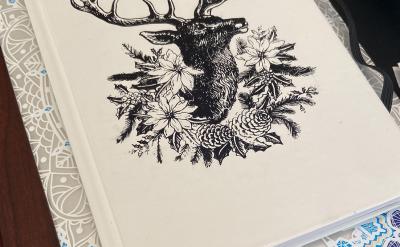
篇1:中考英语:形容词与副词重要知识点解析
重点短语:
?
1.lisen to tapes 听录音
2. ask the teacher for help?向老师请求帮助
3. read aloud 朗读
4. speaking skills 口头表达能力
5.spoken English 英语口语
6. end up 结束
7.later on 以后,随后
8. make mistakes 犯错,出错
9.laugh at 嘲笑,取笑
10.take notes 做笔记,做记录
11.look?…up (词典、参考书)查阅,查找
12. make up 编造,组成
13.deal / do with 处理,应付
14.be angry with 生……的气
15.go by (指时间)过去,消逝
16.try one’s best to do sth.尽力做……
17.break off 突然中止,中断
18. with the help of 在……的帮助下
19.regard…as… 把……当做……
20.be afraid of doing / to do sth害怕做某事
21. first of all 首先,开始
22. have trouble / a difficult / hard time doing sth.
篇2:中考英语:形容词与副词重要知识点解析
重点句型:
1.It’s too hard to understand the voices. 理解那些话有困难。
2. How do you study for a test? 你怎么为考试而学习的?
I study by listening to tapes. 我通过听磁带学习。
3. Studying grammar is a great way to learn a language.
学语法是学习语言的一个好办法。
4.I was afraid to speak in class. 我害怕在课堂上说话。
5. If you don’t know how to spell new words, look them up in a dictionary.
如果你不知道怎么拼单词,可以查词典。
6.It’s our duty to try our best to deal with each challenge in our education with the help of our teachers.
在老师的帮助下,尽我们最大努力对待教育中的每一个挑战是我们的责任。
7.I don’t have a partner to practice English with.
我没有可以一起练习英语的伙伴。
篇3:中考英语:形容词与副词重要知识点解析
【考点直击】
1. 形容词的用法;
2. 副词的用法;
3. 形容词和副词原级、比较级、最高级的用法;
4. 形容词和副词在句中的区别和位置。
【名师点睛】
1. 形容词的用法
(1) 形容词在句中作定语, 表语, 宾语补足语。 例如:
Our country is a beautiful country. (作定语)
The fish went bad. (作表语)
We keep our classroom clean and tidy. (作宾语补足语)
(2) 形容词修饰something, anything, nothing, everything等不定代词时,形容词放在名词后面。
I have something important to tell you.
Is there anything interesting in the film.
(3) 用 and 或 or 连接起来的两个形容词作定语时一般把它们放在被修饰的名词后面。起进一步解释的作用。
Everybody, man and woman, old and young, should attend the meeting.
You can take any box away, big or small.
(4) the+形容词表示一类人或物
The rich should help the poor.
2. 副词的用法
(1) 副词在句中可作状语,表语和定语。
He studies very hard. (作状语)
Life here is full of joy. (作定语)
When will you be back? (作表语)
副词按其用途和含义可分为下面五类:
1)时间副词
时间副词通常用来表示动作的时间。常见的时间副词有:now today, tomorrow, yesterday, before, late, early, never, seldom, sometimes, often, usually, always等。例如:
He often comes to school late.
What are we going to do tomorrow?
He is never been to Beijing.
2)地点副词
地点副词通常用来表示动作发生的地点。常见的地点副词有:here, there, inside, outside, home, upstairs, downstairs, anywhere, everywhere, nowhere, somewhere, down, up, off, on, in, out等。例如:
I met an old friend of mine on my way home.
He went upstairs.
Put down your name here.
3)方式副词
方式副词一般都是回答“怎样的?”这类问题的,其中绝大部分都是由一个形容词加词尾-ly构成的, 有少数方式副词不带词尾-ly, 它们与形容词同形。常见的方式副词有:anxiously, badly, bravely, calmly, carefully, proudly, rapidly, suddenly, successfully, angrily, happily, slowly, warmly, well, fast, slow, quick, hard, alone, high, straight, wide等。例如:
The old man walked home slowly.
Please listen to the teacher carefully.
The birds are flying high.
He runs very fast.
4)程度副词
程度副词多数用来修饰形容词和副词,有少数用来修饰动词或介词短语。常见的程度副词有:much, (a) little, a bit, very, so, too, enough, quite, rather, pretty, greatly, completely, nearly, almost, deeply, hardly, partly等。例如:
Her pronunciation is very good.
She sings quite well.
I can hardly agree with you.
5)疑问副词是用来引导特殊疑问句的副词。常见的疑问副词有:how, when, where, why等。例如:
How are you getting along with your studies?
Where were you yesterday?
Why did you do that?
(2)副词在句中的位置
1)多数副词作状语时放在动词之后。如果动词带有宾语,则放在宾语之后。例如:
Mr Smith works very hard.
She speaks English well.
2)频度副词作状语时,通常放在行为动词之前,情态动词,助动词和be动词之后。例如:
He usually gets up early.
I’ve never heard him singing.
She is seldom ill.
3)程度副词一般放在所修饰的形容词和副词的前面, 但enough作副词用时,通常放在被修饰词的后面。例如:
It is a rather difficult job.
He runs very fast.
He didn’t work hard enough.
4)副词作定语时,一般放在被修饰的名词之后。例如:
On my way home, I met my uncle.
The students there have a lot time to do their own research work.
(3)部分常用副词的用法
1) very, much
这两个副词都可表示“很”,但用法不同。Very用来修饰形容词和副词的原级,而much用来修饰形容词和副词的比较级。例如:
She is a very nice girl
I’m feeling much better now.
Much可以修饰动词,而very则不能。例如:
I don’t like the idea much.
They did not talk much.
2) too, either
这两个副词都表示“也”,但too用于肯定句,either用于否定句。例如:
She can dance, and I can dance, too.
I haven’t read the book and my brother hasn’t either.
3) already, yet
already一般用于语肯定句,yet一般用于否定句。例如:
He has already left.
Have you heard from him yet?
He hasn’t answered yet.
4) so, neither
so和neither都可用于倒装句, 但so表示肯定,neither表示否定。
例如:
My brother likes football and so do I.
My brother doesn’t like dancing and neither do I.
3. 形容词和副词的比较级和最高级
(1) 两个人或事物的比较时(不一定每一方只有一个人或一个事物),用比较
级。
Our teacher is taller than we are.
The boys in her class are taller than the boys in your class.
(2) most 同形容词连用而不用 the,表示 "极,很,非常, 十分"。
It’s most dangerous to be here.
在这儿太危险。
(3) "The+形容词比较级..., the+形容词比较级..."表示 " 越... 就越..."。
The more you study, the more you know.
(4) " 形容词比较级 + and + 形容词比较级 ", 表示 " 越来越... "。
It’s getting hotter and hotter.
(5) 主语+谓语(系动词)+as+形容词原形+as+从句。表示两者对比相同。
This box is as big as mine.
(6) the + 形容词 表示某种人。
He always helps the poor.
(7) 形容词和副词最高级用于三个或三个以上的人和物进行比较。
Shanghai is one of the biggest cities in China.

篇4:中考英语:形容词与副词重要知识点解析
语法:
1、复习一般现在时;
2、by的用法:(1)prep.?在…旁;靠近?near to; beside
Our teacher was sitting by the window.?我们的老师正坐在窗户旁边。
We spent our holiday by the sea.?我们在海边度假。
(2)prep. / adv.?经过?past
He walked by me without speaking.
He walked by without a word.
(3)prep.?用;靠;通过表示方法、手段或所用的工具,后面可以接动名词作宾语。如:
?He makes a living by collecting waste paper.
(4)prep.?“不迟于”,也可用来引导时间状语,意为“到……时候为止…”“在……时候之前”,句中谓语动词用完成时态。如引导的是过去时间状语,谓语动词用过去完成时。
I shall be back by 5 o'clock.
How many English parties had you had by the end of last term?
介词?prep.?通过;沿着?through; along; over
We came through the fields, not by the road.
我们是穿过田野而不是沿那条路来的。
(5)prep.“被;由”常用于被动语态?This bridge was built by the soldiers.
(6)prep.?(指交通等)乘;用 The man came by bus.
【拓展】by accident = by chance偶然地 by oneself 单独,独立地
by the way 顺便说 learn...by heart 记熟 by turns 轮流
by then 到那时 one by one一个一个地 little by little一点一点地
by mistake 由于疏忽,错误地 side by side 肩并肩
【辨析】?by;with;in
by通常表示方法或手段,也可以接动名词表示某种手段;
with表示使用具体的工具;
in表示所用的原料、材料或途径。
篇5:中考英语:形容词与副词重要知识点解析
新一轮 复习备考周期正式开始, 为各位初三考生整理了各学科的复习攻略,主要包括中考必考点、中考常考知识点、各科复习方法、考试答题技巧等内容,帮助各位考生梳理知识脉络,理清做题思路,希望各位考生可以在考试中取得优异成绩!下面是《 英语知识点:形容词和副词》,仅供参考!
形容词和副词
(一)形容词和副词的用法
1)形容词是用来描写或修饰名词或代词的一类词。
2)在句中主要做定语和表语等成分。做定语时修饰名词或代词(一般为不定代词),修饰名词时常放于名词前,修饰不定代词时常放于不定代词后,做表语时和系动词连用,构成一个系表结构。
例如:
Can you hear the loud noise?(定语)你听到大的喧闹声了吗?
The noise is very loud.(表语)喧闹声很大。
The quiet girl is my sister.(定语)那个安静的女孩是我妹妹。
My sister looks very quiet.(表语)我妹妹看起来很安静。
I have nothing new to tell you.(定语)我没什么新东西告诉你。
3)常和形容词连用构成系表结构的连系动词有:
Look(看起来,看上去),feel(感觉),taste(尝起来),smell(闻起来),get(变得),turn(变),become(成为,变得),sound(听起来)等。
例如:
The weather gets warmer and the trees turn green in spring.春天天气变暖和了,树变绿了。
The flowers smell sweet.这些花闻起来很香。
You look fine.你看起来气色很好。
4)副词是用以修饰动词、形容词、其他副词以及全句的词。
例如:
The men and the women walk quickly.这些男人和女人走得很快。
The children walk slowly. 孩子们走得很慢。
They often laugh loudly. 他们经常大声地笑。
Unluckily he hurt his leg. 不幸的是,他伤了腿。
(二)形容词和副词比较级最高级的变化
1)规则变化
构成方式 原级 比较级 最高级
单音节词和少数双音节词 一般在词尾加-er/-est small
fast
young smaller
faster
younger smallest
fastest
youngest
以字母e结尾的形容词,加-r/-st brave
large
cute braver
larger
cuter bravest
largest
cutest
以重读闭音节结尾的词,如果末尾只有一个辅音字母,应先双写该辅音字母,然后加-er/-est big
hot
sad bigger
hotter
sadder biggest
hottest
saddest
*以“辅音字母+y”结尾的双音节词,先改“y”为“i”,再加-er/-est easy
busy
funny easier
busier
funnier easiest
busiest
funniest
多音节词和部分双音节词 在形容词原级前面加more或most exciting
delicious
famous
loudly more exciting
more delicious
more famous
more loudly most exciting
most delicious
most famous
most loudly
*这种双音节词很多都是以“辅音字母+y”结尾的双音节形容词。
2)不规则变化
原级 最高级 比较级
good/well best better
bad/badly/ill worst worse
many/much most more
little least less
old oldest
eldest older
elder
far farthest
furthest farther
further
(三)比较级用法:
1)表示两者(人或事物)的比较,形容词或副词比较级之后用than引出比较对象。
China is bigger than the USA.
This book is more exciting than that one.
注意:比较的对象要表达明确。
My ruler is longer than yours.
2)自身不能与自身进行比较。
3)在形容词或副词比较级前,有时可以用much, a little, far, a lot ,even等来修饰,如much better;a little taller.
(四)adj, adv最高级的用法:
注意:
1. 它是在一定范围内的最……
(≥3)He is the tallest of those three.
2. 所举的对象一定在范围内。
Shanghai is the biggest city in China.
用最高级的几种情况(句式)
1. 当有in/ of,而且of 后不是两者时。
2. 在One of +adj的最高级+ns中。
One of the most famous sights.
3. Which is the best, the red one ,the white one or the green one?
Which / whose/ who, 引导的选择疑问句,有三者以上的选项时
4. The Huang River is the second longest river in China.黄河是中国第二长河。
当形容词和副词前有序数词修饰时,多用最高级
(五)原级、比较级、最高级的句型转换。
1. “not as/so+原级+as”结构可转化为比较级than的结构
如:David didn’t run as fast as Li Lei——Li Lei ran faster than David.
——David run more slowly than Li Lei.
This book isn’t as interesting as that one.——That book is more interesting than this one.
——This book is less interesting than that one.
2. 两个原级的句子合并成含有比较级的句子。
Li Ping is ten years old.
Wei Hua is seven years old.
1)Li Ping is older than Wei Hua.
2)Wei Hua is younger than Li Ping.
3)Li Ping is three years older than Wei Hua.
4)Wei Hua is three years younger than Li Ping.
3. 两个原级的句子合并成含有as… as的原级比较的句子。
1)I’m ten years old. Lucy is ten years old too.
——I’m the same age as Lucy.
2)I read two books Lucy read two books too.
——I read as many books as Lucy.
4. 比较等级的句子中含有any, anyone, anything, other等时,可与最高级的句子进行转换。如:
1)Shanghai is bigger than any other city in China.
the other cities in China.
the others in China.
——Shanghai is the biggest city in China.
2)Zhang Hai jumps higher than any other student in the class.
the others in his class.
the other students in the class.
anyone else in the class.
——Zhang Hai jumps(the)highest in the class.
5. 含有比较级的句子可与含有反义词的句子进行转换。
如:This ruler is longer than that one.
——That ruler is shorter than this one.
Traveling by air is more expensive than traveling by train.
——Traveling by train is less expensive than traveling by air.
6. “like…better”可与“prefer”进行转换。
1)Which coat do you like better? ——Which coat do you prefer?
2)I like red better than black. ——I prefer red to black.
3)I like singing better than dancing. ——I prefer singing to dancing.
7. “like…best”与“favorite”进行转换。
1)Which coat do you like best? ——Which is your favorite coat ?
2)I like bananas best. ——My favorite fruit is bananas.
8. “as...as” 与 “ the same…as” 进行转换。
This bike is as big as that one. ——This bike is the same size as that one.
篇6:中考英语:形容词与副词重要知识点解析
新一轮 复习备考周期正式开始, 为各位初三考生整理了各学科的复习攻略,主要包括中考必考点、中考常考知识点、各科复习方法、考试答题技巧等内容,帮助各位考生梳理知识脉络,理清做题思路,希望各位考生可以在考试中取得优异成绩!下面是《 英语知识点:形容词副词比较级》,仅供参考!
形容词的比较等级(一)
一、形容词、副词的原级(即原形)的使用:
1.常用于 very, too, quite, so(如此,这样)等之后。
I’m very busy. She is too old now. I’m so happy. She is quite right.
2. 还用于同级比较的句型as + 原级+as…(…和…一样),以及not as / so+ 原级+as… (…不如…; 与…不一样)中。 The book is as interesting as that one.这本书与那本书一样有趣。
He is not as tall as I. 他不如我高。 Linda didn’t sing so / as clearly as Kate.
二、形容词、副词的比较级的构成。
(一)、 单音节形容词、副词.
1.一般结尾加er. tall--_____ slow--_______ quiet--_______ quick--_______
long--_______ few--______ short--_______ clean--_______ loud--_______
2. 以字母e结尾的词,在词尾加r. fine –finer, late—later nice—nicer wide—wider
3. 双写末尾的字母,在加er. red--__________
slim(苗条的)--_______ big--________ fat--_______ wet--________ hot--______ thin--___
(二)、双音节和部分多音节形容词、副词.
1.以ow、er、ble结尾的双音节形容词、副词加er构成比较级;
narrow(狭窄的)--________ clever(聪明的)--________ able(有能力的)--______
2. 以辅音字母加y结尾的双音节形容词、副词变y为i, 在加er .
easy--______ happy--______ lucky--______ lovely--______ friendly--_______
busy--______ noisy--_______ lazy--_______ early--_______ funny--________
3、“形容词+ly”构成的双音节和多音节副词;由ing分词和ed分词演变过来的双音节和多音节形容词,在前面加more构成比较级。
slowly--____________ quietly--______________ loudly--____________ quickly--________
happily--____________ easily--_____________ tired--__________ tiring --____________ interesting--___________ interested--____________ relaxed--____________
relaxing--____________ bored--____________ boring--___________
excited--____________ exciting--____________
4.以ful结尾的双音节和多音节形容词,在前面加more构成比较级。
careful(小心的)--___________ wonderful--______________ useful(有用的)--___________ helpful(有益的)--___________ beautiful--___________
(三)、多音节形容词、副词在在前面加more构成比较级。
expensive--________________ important--_______________ popular--________
different--____________ differently--______________ hard-working--__________
(四)、不规则变化(见教材P114).
good / well--________ bad / badly /(坏) ill(病的)--_________ many / much--___________
old(老的;旧的) --_________ old (兄弟姐妹间的长幼关系)--__________
far--__________(距离上的“更远”) far--__________________(程度上的“进一步的”)
little(很少;几乎没有)--___________ My elder brother is two years older than I.
口诀:合二为一共三对, “坏、病”、“两多”并“两好”; 一分为二有两个,一是“远来”、二是“老”; 还有一词含双义,只记“少”来不记“小”。

篇7:中考英语:形容词与副词重要知识点解析
新一轮 复习备考周期正式开始, 为各位初三考生整理了各学科的复习攻略,主要包括中考必考点、中考常考知识点、各科复习方法、考试答题技巧等内容,帮助各位考生梳理知识脉络,理清做题思路,希望各位考生可以在考试中取得优异成绩!下面是《 英语知识点:形容词和副词的辨析》,仅供参考!
形容词和副词的辨析
一 形容词变副词的规律
a.一般的形容词在结尾加ly变为副词。例如:careful-carefully
b.以元音加e结尾的单词要去e在加ly。例如:true-truly
c.辅音加y结尾的单词去y变i在加ly。例如:angry-angrily
d.单音节y结尾直接加ly。例如:shy-shyly
e.以le结尾的单词直接将e变为y。例如:terrible-terribly
f.形容词、副词同形:hard, fast, friendly, late, early, lovely, long。这部分请同学们注意,其中很多单词加ly之后就变成其他意思的单词了。例如:hardly就变成“几乎不”的意思,是小学阶段五大隐形否定词(few,little, never, seldom, hardly)之一。
二 形容词副词比较级的写法:
① 单音节单词后+er。例如:tall-taller, short-shorter
② 重读闭音节双写最后一个字母再加er:hot-hotter, big-bigger, thin-thinner,
fat-fatter
③ 双音节辅音+y结尾去y变i再加er:ugly-uglier, busy-busier, easy-easier, early-earlier, heavy-heavier, healthy-healthier, happy-happier
1.④ 在双音节或多于双音节的单词前面加more:careful-more careful, beautiful-more
2.最高级的写法:
① 单音节单词后+est。例如:tall-tallest, short-shortest
② 重读闭音节双写最后一个字母再加est:hot-hottest, big-biggest, thin-thinnest, fat-fattest
③ 双音节辅音+y结尾去y变i再加est:ugly-ugliest, busy-busiest, easy-easiest early-earliest, heavy-heaviest, healthy-healthiest, happy-happiest
④ 在双音节或多于双音节的单词前面加most:careful-most careful, beautiful-most beautiful等。
beautiful等。
三 形容词和副词的比较级
1.比较级的范围:一般为两者或两个部分进行比较。例如:I’m taller than you. Group One did better than Group Two.
2.比较级的结构:结构上比较级有三个明显的标志。
①than:一般用than连接两个比较的部分。例如:Tom runs faster than Mike.其中Tom和Mike是比较的两部分,用than连接他们进行比较。在than的句式中有一个需要同学们特别注意:I’m taller than any other students in my class.这句话中用than连接的是I和any other students in my class两个部分,其实表示的是最高级的概念,译为我比我们班其他同学都要高,其中any other ……是固定搭配,译为任何其他的。
②a little, much, a lot, even, still:可用来专门修饰比较级。例如:Lisa was sick yesterday, while today she is much better.
③as+形容词或副词原形+as……:译为像……一样。例如:Mary is as clever as Susan.Mary像Susan一样聪明。
另外,两个比较级连用表示“越来越”的意思。例如:Days get longer and longer in Spring.白天在春天越来越长了
四 形容词和副词的最高级
1.最高级的范围: 最高级用于三者或三者以上的人或事物之间的比较,表示在众多人或事物中,其中一个"最……"。例如:My ruler is the longest of all.我的尺是最长的。
3.最高级的结构:结构上比较级有两个明显的标志。
①the:一般用the限定最高级的范围,也可以说,现阶段the就是最高级的主要标志。但是,当形容词最高级前有序数词、物主代词、指示代词、名词所有格等限定词修饰时,最高级前不加the。例如:He is our best teacher.他是我们最好的老师。
②最高级后面往往用of或in介词短语来表示形容词的最高级的比较范围。of短语 指的范围通常是一群人或一些事物,而不是一个场所;如果指一个场所,则用介词in。例如:
He is the strongest of the three.他是三个人中身体最强壮的。
He is the strongest in our class.他是我们班里身体最强壮的。
篇8:中考英语:形容词与副词重要知识点解析
新一轮 复习备考周期正式开始, 为各位初三考生整理了各学科的复习攻略,主要包括中考必考点、中考常考知识点、各科复习方法、考试答题技巧等内容,帮助各位考生梳理知识脉络,理清做题思路,希望各位考生可以在考试中取得优异成绩!下面是《 英语知识点:形容词变副词规律总结》,仅供参考!
形容词变副词规律总结
规则变化
范围 变化规则 例词
大部分形容词 加ly careless----carelessly
quiet----quietly
different----differently
辅音加le结尾的形容词 变le为ly possible----possibly
terrible----terribly
comfortable----comfortably
gentle----gently
simple----simply
whole-wholly(例外)
元音字母加le结尾的形容词 加ly sole-solely
以y结尾且读音为 / i /结尾的形容词 变le为ly easy----easily angry----angrily
noisy----noisily happy----happily
heavy----heavily healthy----healthily
以y结尾且读音为 / ei /结尾的的形容词 加ly shy-shyly
dry-dryly
gay--gayly/gaily
不规则变化
本身既是形容词也是副词,无需改变 fast----fast
early----early
high----high
hard----hard
late----late
far----far
wide----wide
alone----alone
形容词和副词为完全不同的单词 good----well
初中阶段唯一一个需要去掉字母e的单词 true----truly
虽然以ly结尾,但却是形容词,不能直接用来修饰动词 friendly
lively
lovely
lonely
Likely
有些形容词本身即为副词,同时也有加ly的副词形式。但加不加ly意思不一样,使用时需注意 wide(形容词,宽阔的,睁大的)----wide(副词,睁大地)/widely(副词,广泛地),late(形容词,晚的)-----late(副词,晚地),lately(最近)
high(形容词,高的)----high(副词,高地)/highly(副词,高度地)
特别容易犯错的副词
形容词 副词 备注
hard hard hard副词容易写成hardly, hardly意思为“几乎不”,与hard无任何关系
friendly 无 不能用friendly直接修饰动词,只能改成in a friendly way“用一种友好的方式”。如:
He smiled at me in a friendly way.
excited excitedly 容易拼错
healthy healthily 容易拼错
polite politely 不用去掉字母e。类似的词还有:widely, nicely, closely,
篇9:中考英语:形容词与副词重要知识点解析
新一轮 复习备考周期正式开始, 为各位初三考生整理了各学科的复习攻略,主要包括中考必考点、中考常考知识点、各科复习方法、考试答题技巧等内容,帮助各位考生梳理知识脉络,理清做题思路,希望各位考生可以在考试中取得优异成绩!下面是《 英语知识点:形容词、副词的比较级和最高级》,仅供参考!
形容词、副词的比较级和最高级
二. 教学重点:
1. 形容词、副词比较级和最高级的构成
2. 形容词、副词比较级和最高级的使用
三. 具体内容:
(一)形容词、副词比较级和最高级的构成:
1. 单音节词和少数双音节词比较级和最高级的规则变化:
规则 原级 比较级 最高级
1.在词尾后直接加-er/est tall taller tallest
2.词尾是e,只加-r/st nice nicer nicest
3.以辅音字母加y结尾的,把y变i再加-er/est happy happier happiest
4.重读闭音节,末尾只有一个辅音字母,双写这个辅音字母,再加-er/est thin thinner thinnest
2. 其他双音节词或多音节词,在该词前面加-more/most
beautiful—more beautiful—(the) most beautiful
3. 由形容词加ly构成的双音节词和多音节词,都是在该词前加-more/most.
quickly—more quickly—(the) most quickly
difficultly—more difficultly—(the) most difficultly
4. 不规则变化:
good/well better best
bad/badly worse worst
many/much more most
little less least
far farther/further farthest/furthest
(二)形容词比较级和最高级的用法:
1. 原级的用法:
用于两者之间对比,意思为“……和……相同”
A+v.+as….+形容词原级as B
Tom is as honest as Jack.
Her skin is as white as snow.
My dog is as old as that one.
He is not as (=so) tall as I.
The weather here is not as(=so)cool as the weather in Harbin.
2. 比较级的用法:
1)A+形容词比较级+than+ B
Susan is happier than Jane.
His brother is younger than me.
Beijing is more beautiful than Osaka.
形容词比较级前还可以用much, even, still, a little来修饰。
2)数字+形容词比较级+than
I’m two years older than you.
She is a head taller than me.
3)比较级+and+比较级,表示“越来越……”
The earth is getting warmer and warmer.
China becomes more and more stronger.
4)the +比较级,the +比较级结构,表示“越……就越……”
The more I study it, the more I like it.
5)which/who +is +比较级
Which city is bigger, Beijing or Tianjin?
Who is happier, you or me?
3. 最高级用法:
用于三者及以上的人或事物的比较,最高级前加the,最高级前有物主代词,序数词和名词所有格时,不加定冠词,后面跟带in或of表范围的短语。
1)one of the +最高级
Shanghai is one of the most beautiful cities in China.
Our city is one of the safest cities in the world.
Most people like apples.
Most of the boys are good.
It is our nearest neighbor in space.
2)最高级意义的表达方法:
例句
最高级 She is the best in her class.
比较级 She is better than any other student in her class.
No other student in her class is better than she.
原级 No other student in her class is as good as she.
(三)副词比较级和最高级的用法:
1. 原级主要的句型:
1)as+副词原级+as
Tom runs as fast as Jones.
not as/so+副词原级+as
He didn’t come as/so early as Li Lei.
2)too+副词原级+to do sth.
Jean rides too slowly to catch up with me.
3)so +副词原级+ that
Jean rides so slowly that she can’t catch up with me.
4)副词原级+enough to do sth.
Jean doesn’t ride fast enough to catch up with me.
2. 比较级的用法:
1)比较级+than。当前后使用的动词相同时,通常用助动词来代替后面的动词,该动词或助动词可以省略。
Lily run faster than Mary(did).
2)比较级+and +比较级
The days are getting longer and longer in summer.
3)the more…the more…
The harder you work, the better you will learn.
3. 最高级的用法:
副词最高级前一般有the,也可省略。
He works (the) hardest of all the students in the class.

篇10:中考英语:形容词与副词重要知识点解析
新一轮 复习备考周期正式开始, 为各位初三考生整理了各学科的复习攻略,主要包括中考必考点、中考常考知识点、各科复习方法、考试答题技巧等内容,帮助各位考生梳理知识脉络,理清做题思路,希望各位考生可以在考试中取得优异成绩!下面是《 英语知识点:形容词副词比较级最高级使用注意事项》,仅供参考!
形容词副词比较级最高级使用注意事项
◇比较应在同类事物之间进行。
误:Your English is better than me.
正:Your English is better than mine.
◇比较级前可以有一个表示程度的状语,
最常见的三大修饰词是:a little, much, even。
以下单词也可用来修饰:any, far, still, a lot, yet, rather。
My sister is a little taller than me.
Their house is much larger than ours.
另外,名词短语也可修饰比较级,说明程度。
I’m three years older than he.
特别提醒:very, quite, too不可修饰比较级。
◇避免重复使用比较级。
误:He is more kinder to small animals than I.
正:He is much kinder to small animals than I.
误:He is more cleverer than his brother.
正:He is cleverer than his brother.
◇比较要符合逻辑,在同一范围内比较时,避免将主语含在比较对象中,这时需使用other来排除自身。
误:China is larger that any country in Asia.
正:China is larger than any other country in Asia.
误:John studies harder than any student in his class.
正:John studies harder than any other student in his class.
正:John studies harder than any of the other students in his class.
正:John studies harder than anyone else in his class.
◇比较要遵循前后一致的原则,注意前后呼应。
The population of Shanghai is larger than that of Beijing.
It is easier to make a plan than to carry it out.
◇序数词通常只修饰最高级。
Africa is the second largest continent.
The Yellow River is the second longest river in China.
This is the third most popular song of Michael Jackson.
◇为避免重复,我们通常用that, those, one, ones代替前面出现的名词。that代替可数名词单数和不可数名词,those代替可数名词复数。one既可指人又可指物,只能代替可数名词。
The weather in China is different from that in America.
The book on the table is more interesting than that(或the one)on the desk.
?????? A box made of steel is stronger than one made of wood.
?????? 误:In winter, the weather of Beijing is colder than it of Shanghai.
正:In winter, the weather of Beijing is colder than that of Shanghai.
◇“否定词 + 比较级”相当于最高级。
----Wait until we get a satisfactory reply, will you?
----I couldn't agree more. The idea sounds great to me.
Nothing is so easy as this. =Nothing is easier than this. =This is the easiest thing.
◇比较级前一般不加冠词。但表示两者中较突出者,且比较级后又有名词或出现了of the two,这时比较级前一定要加the。
He is the taller of the two.
Of the two jobs,he chose the harder.
Which is the younger one, Lily or Lucy?
试比较:
Which is larger, Canada or Australia?
Which is the larger country, Canada or Australia?
She is taller than her two sisters.
She is the taller of the two sisters.
◇不含than 的比较级前可加不定冠词修饰,构成“a/an+比较级+单数可数名词”表示 “一个更……的人/物”。
Why don’t you use a sharper knife? 你为什么不用一把更锋利的刀呢?
◇比较级than 后应用人称代词的主格,但非正式语体中常用宾格。
He is taller than I/me.
◇为避免重复,比较级中同样的动词用助动词do, does, did替代。
I spend less time doing homework than John does.
She tells more funny jokes than we do.
以下内容不是初中教学的重点,仅供拓展之用。
◇形容词most前面没有the,不表示最高级的含义,只表示“非常”。
It is a most important problem. =It is a very important problem.
◇倍数表达法
▲A is three(four, etc.)times the size(height, length etc.)of B.
The new building is four times the size(the height)of the old one.
这座新楼是那座旧楼的四倍大(高)/这座新楼比那座旧楼大(高)三倍。
▲A is three(four, etc.)times as big(high, long, etc.)as B.
Asia is four times as large as Europe. 亚洲是欧洲的四倍大/亚洲比欧洲大三倍。
▲A is three (four, etc.)times bigger(higher, longer, etc.)than B.
Your school is three times bigger than ours.你们的学校比我们的学校大三倍。
用times表倍数通常用于三倍以上,两倍可以用twice或double.